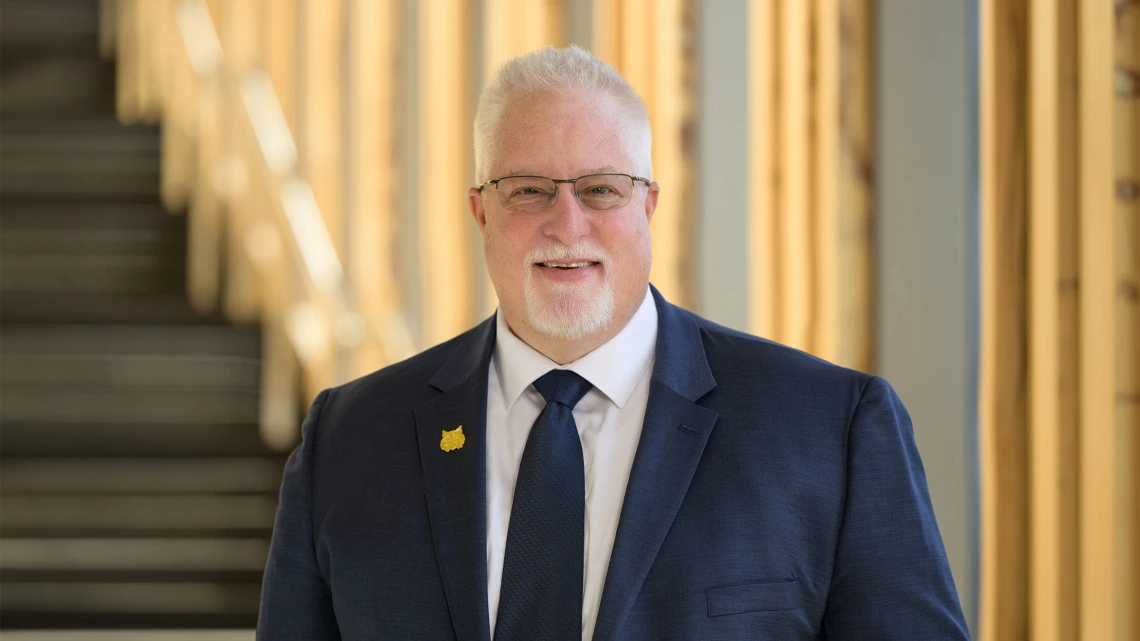Connecting with Dr. Kevin Lohenry
Interim dean says the new College of Health Sciences provides an additional opportunity to help meet Arizonans’ health care needs.

Interim College of Health Sciences Dean Kevin Lohenry, PhD, PA-C, says the new college will provide additional pathways to health care careers for both undergraduate and graduate students, alleviating Arizona’s shortfall.
In a move to help address Arizonans’ increasing need for health care around the state, the Arizona Board of Regents approved the University of Arizona Health Sciences’ plan to launch the new College of Health Sciences, which will begin operations on July 1. With five initial programs – midwifery, physician assistant, Doctor of Physical Therapy, Genetic Counseling and Clinical Translational Sciences – the college will provide a mix of health graduate professional programs with interprofessional and interdisciplinary science training.
Health Sciences Connect recently caught up with interim Dean Kevin Lohenry, PhD, PA-C, to learn more about the vision for the college, how the college will target underserved populations and what opportunities there are with the programs and college.
What is your vision for the new College of Health Sciences?
Our leaders within the college are focused on building the health workforce of the future that reflects the rich diversity of the communities in our state. We are all excited to equip our students with the knowledge and skills to navigate the important clinical translational research outcomes that shape our lives while preparing them to become compassionate, evidence-based health care providers and educators.
How will it integrate with our current colleges?
Several of our current programs are already strongly engaged with our UArizona Health Sciences colleges while others will build collaborative partnerships that strengthen interprofessional education and interdisciplinary research across the campuses. Many of our programs look forward to developing opportunities for dual degrees while all our programs seek to collaborate with our undergraduate colleges in building strong pathways to our graduate health professions and clinical translational sciences programs.
How do the five initial offerings support the Health Sciences mission?
UArizona Health Sciences is focused on improving health and human potential by educating the next generation of health professionals and investigating and solving critical health care problems with compassionate and culturally sensitive care. Our programs were built with this commitment in mind, and each program will contribute to building healthier communities for all of Arizona.
The shortage of genetic counselors in Arizona has caused significant delays in patients and providers accessing critically important genetic information to help inform health care decisions. Our Graduate Genetic Counseling Program will continue to build the genetic counseling workforce for the state while exploring ways to expand access to information in a timely fashion for patients and providers. As maternal health challenges continue to grow, our midwifery program will create additional maternal support where it is needed most. With a focus on rural and indigenous health a critical need, the PA and PT programs will expand the diversity of the field and reflect the communities they are serving.
Across these health professional programs our Clinical Translational Sciences Program will provide significant impact for the health care being delivered by these professionals as they learn to navigate the scientific literature from this important research.
How will faculty appointments and staffing be determined?
The College of Health Sciences will include many current and future programs that will require additional faculty and staff to manage the increasing work being done. This includes faculty, student and curricular affairs teams to help our graduate students navigate their respective programs with success. It also includes important partnerships with the University of Arizona Health Sciences administrative team including equity, diversity, and inclusion to ensure success across all aspects of the college. The determination of specific roles will be based on best practices for our institution.
Will this be for undergraduate, graduate, career-shifting, technical-specialty seeking students?
Each program in the new college will have its own focus on specific types of students. All five programs are looking for diverse perspectives and experiences to enhance the classroom experience and build a workforce that reflects the diversity of our state. We hope to build several additional programs that will provide health professionals with an opportunity for growth and development in education, health policy, leadership, and research, and we plan to explore other health professional shortages in our state to determine where we might contribute to improving the health of all. While we are all educating graduate students, we are certainly excited to provide our undergraduate pre-health students with options to complete their career paths here at the University of Arizona.
Where will the new college be located?
The college will be located in the Health Sciences Innovation Building on the Tucson campus and will also have a small footprint on the Phoenix campus. Graduate Genetic Counseling, Midwifery, PA and PT will be located in Tucson, while our Clinical Translational Sciences will continue in Tucson and Phoenix.
Will funding for current or future projects in my program be affected by the new college?
Funding for the new college comes from investments by the Arizona legislature with the New Economy Initiatives focused on the future health care workforce, as well as appropriations for ongoing college administrative support of faculty, staff and students. The programs within the college have already been supported with funding and will not impact any current or future projects in other colleges or programs.
We already have an administrative Health Sciences unit. How was the name determined?
The name for the College of Health Sciences is consistent with similar models of colleges housing multiple health professional programs across the country. The process for researching and reviewing potential names took more than four months of planning by an interprofessional group of leaders and ultimately recommended this name to the institution. We believe this name is the best representation of the diverse programs represented within.

